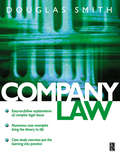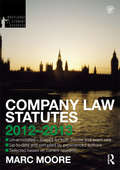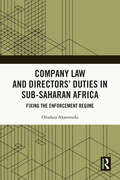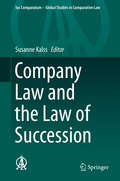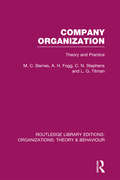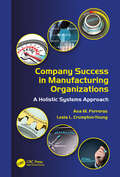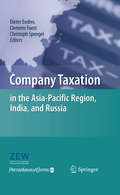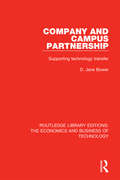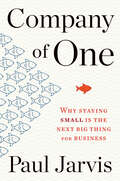- Table View
- List View
Company Directors' Liability and Creditor Protection (Contemporary Commercial Law)
by Andrew KeayThe book provides an analytical exposition of the law concerning directors’ liability for the losses sustained by their companies’ creditors, when the directors’ companies are in financial distress or become insolvent. It is a detailed one-stop resource for obtaining a good understanding of the law which has developed from legislation and case law. In particular, there is a detailed consideration of what needs to be proved, what defences there are, and what might be the issues of concern for all parties. A doctrinal method is adopted and there is extensive analysis of the relevant legislation and case law. Rather than merely referring to cases to support propositions, the discussion considers many of the cases in context and in depth and their relevance to the aim of the book. The book also endeavours to provide views, in a practical way, on aspects of the law and it identifies problems and how they may be addressed. Of interest to legal practitioners and insolvency practitioners alike, in addition the book will be useful to directors, government officials and academics.
Company Directors' Responsibilities to Creditors
by Andrew KeayThis timely work is the first to comprehensively examine directors' responsibilities to creditors in times of financial strife, as well as addressing when these responsibilities arise, and what directors should have to do to ensure that they comply with their obligations. Keay explores the relevant issues from doctrinal, normative and comparative perspectives and addresses the question as to when directors are liable for wrongful trading, fraudulent trading or breach of their duties to creditors and whether directors should be held responsible for the before mentioned. Besides the relevant UK legislation and case law, legislation and case law from Australia, Canada, Ireland and the United States are examined and compared and reforms which take into account the aims and rationale of the relevant legislation as well as creditors' interests are proposed and assessed. Importantly, new approaches for courts which would make the nature of the responsibility and its timing more precise are suggested. Company directors have certain responsibilities to creditors of their companies. In particular, they should avoid fraudulent and wrongful trading and consider, as part of their duties, the interests of creditors when their companies might be, or are, in financial difficulty. The work is precipitated by the lack of coherence in the consideration of wrongful trading and the recent delivery of important cases on fraudulent trading. Also, this timely work is the first to comprehensively examine directors' responsibilities to creditors in times of financial strife, as well as addressing when these responsibilities arise, and what directors should have to do to ensure that they comply with their obligations. Keay explores the relevant issues from doctrinal, normative and comparative perspectives and seeks to address the question as to when directors are liable for wrongful trading, fraudulent trading or breach of their duties to creditors and whether directors should be held responsible for wrongful trading and failing to consider the interests of creditors. Besides the relevant UK legislation and case law, legislation and case law from Australia, Canada, Ireland and the United States are examined and compared, and reforms which take into account the aims and rationale of the relevant legislation as well as creditors' interests are proposed and assessed. Importantly, new approaches for courts which would make the nature of the responsibility and its timing more precise are suggested.
Company Governance: Fulfilling Broad Mission and Purpose-What the India Way Can Teach Us about Balancing the Interests of Different Stakeholders
by Michael Useem Peter Cappelli Harbir Singh Jitendra V. SinghIn Western companies, the board of directors functions as the owners' eyes and ears, monitoring the performance of company executives and ensuring that they protect shareholder interests. In this chapter, authors Peter Cappelli, Harbir Singh, Jitendra Singh, and Michael Useem show how, in keeping with the India Way, directors of Indian companies balance the interests of all those with a claim on the company-its employees, its customers, the broader community, even the nation-as well as the interests of actual shareholders. Using the example of Infosys Technologies, which has built a governance model that blends both the rules-based approach of Western firms and the values-based approach indigenous to India, the authors make a compelling case for the India Way of corporate governance-and how putting it into practice can help U.S. executives to contribute not just to investor returns, but to their communities; to focus not just on cutting labor costs, but on building their workforces. This chapter was originally published as Chapter 6 of The India Way: How India's Top Business Leaders Are Revolutionizing Management.
Company Governance: Fulfilling Broad Mission and Purpose-What the India Way Can Teach Us about Balancing the Interests of Different Stakeholders
by Michael Useem Peter Cappelli Harbir Singh Jitendra V. SinghIn Western companies, the board of directors functions as the owners' eyes and ears, monitoring the performance of company executives and ensuring that they protect shareholder interests. In this chapter, authors Peter Cappelli, Harbir Singh, Jitendra Singh, and Michael Useem show how, in keeping with the India Way, directors of Indian companies balance the interests of all those with a claim on the company-its employees, its customers, the broader community, even the nation-as well as the interests of actual shareholders. Using the example of Infosys Technologies, which has built a governance model that blends both the rules-based approach of Western firms and the values-based approach indigenous to India, the authors make a compelling case for the India Way of corporate governance-and how putting it into practice can help U.S. executives to contribute not just to investor returns, but to their communities; to focus not just on cutting labor costs, but on building their workforces. This chapter was originally published as Chapter 6 of The India Way: How India's Top Business Leaders Are Revolutionizing Management.
Company Kayda Ek Parichay Second Semester FYB.COM New NEP Syllabus - RTMNU: कंपनी कायदा एक परिचय दुसरे सत्र एफ.वाय.बी.कॉम. नवीन एन.इ.पी. अभ्यासक्रम - राष्ट्रसंत तुकडोजी महाराज नागपूर विद्यापीठ
by Dr Prakash Dehliwalकंपनी कायदा: एक परिचय हे पुस्तक राष्ट्रसंत तुकडोजी महाराज नागपूर विद्यापीठाच्या बी. कॉम. प्रथम वर्षाच्या दुसऱ्या सेमिस्टरसाठीच्या अभ्यासक्रमावर आधारित आहे. या पुस्तकात कंपनी कायदा २०१३ आणि त्यानंतरच्या सुधारणा समाविष्ट करण्यात आलेल्या आहेत. लेखक डॉ. प्रकाश देहलीवाल यांनी विद्यार्थ्यांना सोप्या व समजण्याजोग्या भाषेत कंपनी कायद्याचे मूलभूत ज्ञान देण्याचा प्रामाणिक प्रयत्न केला आहे. पुस्तकात कंपनीची संकल्पना, अर्थ, व्याख्या, वैशिष्ट्ये, कंपनीचे प्रकार, नोंदणी प्रक्रिया, प्रवर्तक, घटनापत्रक, नियमावली, सभासदत्व आणि भागभांडवल अशा महत्त्वपूर्ण घटकांचा समावेश आहे. यामध्ये खाजगी व सार्वजनिक कंपन्यांतील फरक, कंपनी आणि भागीदारी संस्थेतील भिन्नता, तसेच कंपनीवरील निगमीय पडदा हटवण्याची संकल्पना स्पष्टपणे मांडली आहे. अभ्यासक्रमाशी सुसंगत सर्व युनिट्सचा समावेश असून उदाहरणे, प्रश्नसंच आणि स्पष्टीकरणे विद्यार्थ्यांना परीक्षेच्या दृष्टिकोनातून उपयुक्त ठरतील. हे पुस्तक कंपनी कायद्याच्या शिकवणुकीसाठी एक प्रभावी मार्गदर्शक असून वाणिज्य शाखेतील विद्यार्थ्यांना अत्यंत उपयुक्त ठरते.
Company Law
by Douglas SmithCompany Law is essential reading for business and law students, and for those studying for professional exams. The theoretical concepts are explored and developed with the use of a variety of case examples to place the learning in context. Comprehensive pedagogy with objectives, review questions, summaries, discussion questions and a case study exercise to consolidate the learning in each chapter. The accessible and concise treatment of the issues explored makes the learning easy to follow and more pertinent to the student needs, particularly for those who are studying a one-semester course. Easy to read,with a user friendly layout, Company Law, with the use of case studies and review questions leads the reader through the various stages involved with creating and managing a private company through to dissolution.Building on the learning covered in the companion textbook Business Law, this text is a user friendly and comprehensive introduction to all aspects of company law.
Company Law (Key Facts Key Cases)
by Chris Shepherd Ann RidleyKey Facts Key Cases Company Law will ensure you grasp the main concepts of your Company Law module with ease. This book explains the facts and associated case law for: - Shares - Capital Maintenance - Failure and Liquidation - Directors - Borrowing Ann Ridley is Interim Dean, Business and Management, Accounting and Law at The University of Gloucestershire. Chris Shepherd is Lecturer in Law at London South Bank University. Key Facts Key Cases is the essential series for anyone studying law at LLB, postgraduate and conversion courses. The series provides the simplest and most effective way to absorb and retain all of the material essential for passing your exams. Each chapter includes: diagrams at the start of chapters to summarise key points structured headings and numbered points to allow for clear recall of the essential points charts and tables to break down more complex information Chapters are also supported by a Key Cases section which provides the simplest and most effective way to absorb and memorise essential cases needed for exam success. Essential and leading cases are explained The style, layout and explanations are user friendly Cases are broken down into key components by use of a clear system of symbols for quick and easy visual recognition Series editors: Jacqueline Martin and Chris Turner LLM, who is Senior Lecturer in law at Wolverhampton University.
Company Law Statutes 2012-2013 (Routledge Student Statutes)
by Marc Moore‘Focused content, layout and price - Routledge competes and wins in relation to all of these factors’ - Craig Lind, University of Sussex, UK ‘The best value and best format books on the market.’ - Ed Bates, Southampton University, UK Routledge Student Statutes present all the legislation students need in one easy-to-use volume. Developed in response to feedback from lecturers and students, this book offers a fully up-to-date, comprehensive, and clearly presented collection of legislation - ideal for LLB and GDL course and exam use. Routledge Student Statutes are: • Exam Friendly: un-annotated and conforming to exam regulations • Tailored to fit your course: 80% of lecturers we surveyed agree that Routledge Student Statutes match their course and cover the relevant legislation • Trustworthy: Routledge Student Statutes are compiled by subject experts, updated annually and have been developed to meet student needs through extensive market research • Easy to use: a clear text design, comprehensive table of contents, multiple indexes and highlighted amendments to the law make these books the most student-friendly Statutes on the market Competitively Priced: Routledge Student Statutes offer content and usability rated as good or better than our major competitor, but at a more competitive price • Supported by a Companion Website: presenting scenario questions for interpreting Statutes, annotated web links, and multiple-choice questions, these resources are designed to help students to be confident and prepared.
Company Law and Directors’ Duties in Sub-Saharan Africa: Fixing the Enforcement Regime (Routledge Studies on Law in Africa)
by Oludara AkanmiduThis book provides a critical analysis of the enforcement regime for breach of directors’ duties in sub-Saharan Africa. Focusing on Nigeria, Kenya, Ghana, and Tanzania, it interrogates the current ‘state of play’ regarding the enforcement of directors’ duties in sub-Saharan African countries.The book examines the effectiveness of enforcement, the reasons for its successes or failures and how it might be improved in these countries. Finally, taking into consideration the specific socio-cultural context of the countries in question, it offers persuasive and practical avenues for reform.This book will be of interest to scholars and practitioners of comparative corporate law and corporate governance in Africa.
Company Law and Sustainability
by Sjåfjell, Beate and Richardson, Benjamin J. Beate Sjåfjell Benjamin J. RichardsonThis investigation of the barriers to and opportunities for promoting environmental sustainability in company law provides an in-depth comparative analysis of company law regimes across the world. The social norm of shareholder primacy is the greatest barrier preventing progress, and it also helps explain why voluntary action by companies and investors is insufficient. By deconstructing the myth that shareholder primacy has a legal basis and challenging the economic postulates on which mainstream corporate governance debate is based, Company Law and Sustainability reveals a surprisingly large unexplored potential within current company law regimes for companies to reorient themselves towards sustainability. It also suggests possible methods of reforming the existing legal infrastructure for companies and provides an important contribution to the broader debate on how to achieve sustainability.
Company Law and the Law of Succession (Ius Comparatum - Global Studies in Comparative Law #5)
by Susanne KalssThis book is one of the first to link company law to the law of succession by concentrating on family businesses. It shows that, to understand the legal framework underlying the daily operations of family businesses, one needs legal analysis, empirical data, psychological and sociological knowledge. The book works on the premise that, since many businesses have been founded by families, practitioners need to develop an understanding of the legal background of such businesses and build up experience to be able to create contracts, trusts, foundations and other legal mechanisms to give shape to systems and procedures for the transfer of shares and control within the family. Comparing the national legal order, techniques, and mechanisms in a range of countries, the book examines parallel developments in these fields of law across the world. Finally, it demonstrates the room for companies, shareholders and the members of a family to develop individual solutions within the legal framework for transferring businesses and shares to the next generation.
Company Lawcards 2012-2013 (Lawcards)
by RoutledgeRoutledge Lawcards are your complete, pocket-sized guides to key examinable areas of the undergraduate law curriculum and the CPE/GDL. Their concise text, user-friendly layout and compact format make them an ideal revision aid. Helping you to identify, understand and commit to memory the salient points of each area of the law, shouldn’t you make Routledge Lawcards your essential revision companions? Fully updated and revised with all the most important recent legal developments, Routledge Lawcards are packed with features: Revision checklists help you to consolidate the key issues within each topic Colour coded highlighting really makes cases and legislation stand out Full tables of cases and legislation make for easy reference Boxed case notes pick out the cases that are most likely to come up in exams Diagrams and flowcharts clarify and condense complex and important topics '...an excellent starting point for any enthusiastic reviser. The books are concise and get right down to the nitty-gritty of each topic.' - Lex Magazine Routledge Lawcards are supported by a Companion Website offering: Flashcard glossaries allowing you to test your understanding of key terms and definitions Multiple Choice Questions to test and consolidate your revision of each chapter Advice and tips to help you better plan your revision and prepare for your exams Titles in the Series: Commercial Law; Company Law; Constitutional Law; Contract Law; Criminal Law; Employment Law; English Legal System; European Union Law; Evidence; Equity and Trusts; Family Law; Human Rights; Intellectual Property Law; Jurisprudence; Land Law; Tort Law
Company Manners
by Lois WyseThe unwritten (until now) rules of business conduct have changed. In Company Manners, a successful executive separates the do's from the don'ts in the '90s. Includes sections on sexual harrassment, family leave, flextime, strategies for surviving mergers, reorganizations, and corporate warfare. Advertising in Executive Female.
Company Organization: Theory and Practice (Routledge Library Editions: Organizations)
by M . Barnes A. H. Fogg C. N. Stephens L. G. TitmanThis summary of theory and practice is inspired by the belief that cut and dried solutions to management problems are inappropriate and that every set of circumstances requires a unique synthesis of experience and relevant theories. In this book the authors have reviewed the main texts and theories of organization and have added the lessons learned from an unrivalled volume of practical experience, garnered from some 900 consultants working in more than twenty countries.
Company Sale Process
by William E. FruhanLays out the steps, the timeline, and the process by which a company is sold. Focuses on the sale of companies with enterprise values greater than $100 million. These transactions are large enough to require the help of a financial adviser and attract both strategic and financial bidders. The sale process described is that of a private auction, including a confidential information memorandum and a "roadshow" to sell the high-yield debt needed to fund the transaction. Covers issues such as identifying and attracting bidders; dealing with the concerns of the managers of the selling company; negotiating issues in a definitive merger agreement; and post-sale issues.
Company Strategy and Organizational Design: Organizations: Company Strategy And Organizational Design (Routledge Library Editions: Organizations)
by Roger MansfieldGetting strategies and structures right for changing market conditions and successfully matching strategies and structures with each other, are crucial. This volume reviews and develops the extensive literature in the areas of business policy and organizational behaviour, taking the subject further by breaking down boundaries between subject areas within management studies; by adopting a dynamic approach to organizational issues; and by synthesizing the disparate, often confusing research findings in this area into a general theoretical approach which can be assimilated by managers faced with the problems of the real world.
Company Success in Manufacturing Organizations: A Holistic Systems Approach (Systems Innovation Book Series)
by Ana M. Ferreras Lesia L. Crumpton-YoungIn the past, company success was typically measured by financial indicators. Lately though, non-financial measures such as employee morale have become popular. Although there are approaches that look into quantitative and qualitative performance measures affecting company success, none of them characterize it in a holistic way, combining all the critical performance measures. This book presents a multifaceted approach that prepares engineers and future organizational leaders/managers to measure, monitor, and predict company success in a more meaningful way.
Company Taxation in the Asia-Pacific Region, India, and Russia
by Christoph Spengel Dieter Endres Clemens FuestThe Asian-Pacific countries as well as India and Russia offer multinational companies all the benefits of booming economies in a world of recession. However, the investor must be aware of the tax regime under which he will operate. This survey presents the rates, definitions of taxable income and the incentives available in a complete, yet concise form. It goes on to review tax minimisation strategies and concludes with a comparison of the overall tax burdens for investors in each country derived from the Devereux/Griffith formulae - a methodology well known within the EU, but applied to this region for the first time.
Company Towns of Michigan's Upper Peninsula
by Christian HolmesIn the company towns of Michigan's Upper Peninsula, a worker's boss did extra duty as landlord, store owner and constable. The on-site mill manager in Simmons, a town named after the furniture maker, even ran a successful baseball team. Built around iron mines and lumber concerns and directed by prominent entrepreneurs like Henry Ford, these industrial hamlets once lined the shores of Lakes Michigan and Superior. Author Christian Holmes uncovers rich stories of struggle and celebration as he explores the vestiges of these vanished communities and their lasting legacy in the identity of the Upper Peninsula.
Company and Campus Partnership: Supporting Technology Transfer (Routledge Library Editions: The Economics and Business of Technology #8)
by D. Jane BowerOriginally published in 1992, this study looks at the ways in which company and campus can co-operate to spread the risk and cost of research. It analyses joint ventures in an international context, focusing particularly on the USA, France and Japan, comparing their management strategies with the UK in a variety of industries. It discusses issues such as the brain drain and the growth of science parks, looking at the most succesful industrial policies. With its focus on technology transfer, joint ventures and strategic management this book will appeal to the practising manager as well as the academic.
Company of One: Why Staying Small Is the Next Big Thing for Business
by Paul JarvisWhat if the real key to a richer and more fulfilling career was not to create and scale a new start-up, but rather, to be able to work for yourself, determine your own hours, and become a (highly profitable) and sustainable company of one? Suppose the better—and smarter—solution is simply to remain small? This book explains how to do just that.Company of One is a refreshingly new approach centered on staying small and avoiding growth, for any size business. Not as a freelancer who only gets paid on a per piece basis, and not as an entrepreneurial start-up that wants to scale as soon as possible, but as a small business that is deliberately committed to staying that way. By staying small, one can have freedom to pursue more meaningful pleasures in life, and avoid the headaches that result from dealing with employees, long meetings, or worrying about expansion. Company of One introduces this unique business strategy and explains how to make it work for you, including how to generate cash flow on an ongoing basis. Paul Jarvis left the corporate world when he realized that working in a high-pressure, high profile world was not his idea of success. Instead, he now works for himself out of his home on a small, lush island off of Vancouver, and lives a much more rewarding and productive life. He no longer has to contend with an environment that constantly demands more productivity, more output, and more growth. In Company of One, Jarvis explains how you can find the right pathway to do the same, including planning how to set up your shop, determining your desired revenues, dealing with unexpected crises, keeping your key clients happy, and of course, doing all of this on your own.
Company's Ethical Climate
Explains what a company's ethical climate is, describes the forces that shape it, and ways managers can work to alter a firm's ethical climate.
Compaq Computer: Consumer Notebook Group
by David E. Bell Ann LeamonPresents the background for a video of a focus group on Compaq Computer's new consumer notebook. Engineers, manufacturers, and retailers had collaborated on the product design, which has been approved by the executive committee. A launch is scheduled for nine months later. Does the focus group support the decision? Is it reliable? Any changes mean going against conventional wisdom and possible failure in a new market. Must be used with the video.
Compaq Computer: Intel Inside?
by David E. Bell Ann LeamonPresents the results of quantitative and qualitative market research on the possible acceptance of a non-Intel processor in Compaq Computer's consumer notebook line. If the low-priced, non-Intel notebook is a success, the company will maintain or increase its 45% share of the market. If not, it could cease to be a player in the market it has created and filled. Students must evaluate the reliability of the research and decide which of three products to produce.
Comparable Worth: Theories and Evidence (Social Institutions And Social Change Ser.)
by England PaulaThis volume provides a detailed description of the situation of women in employment in the early 1990s and considers how sociological and economic theories of labor markets illuminate the gap in pay between the sexes.



